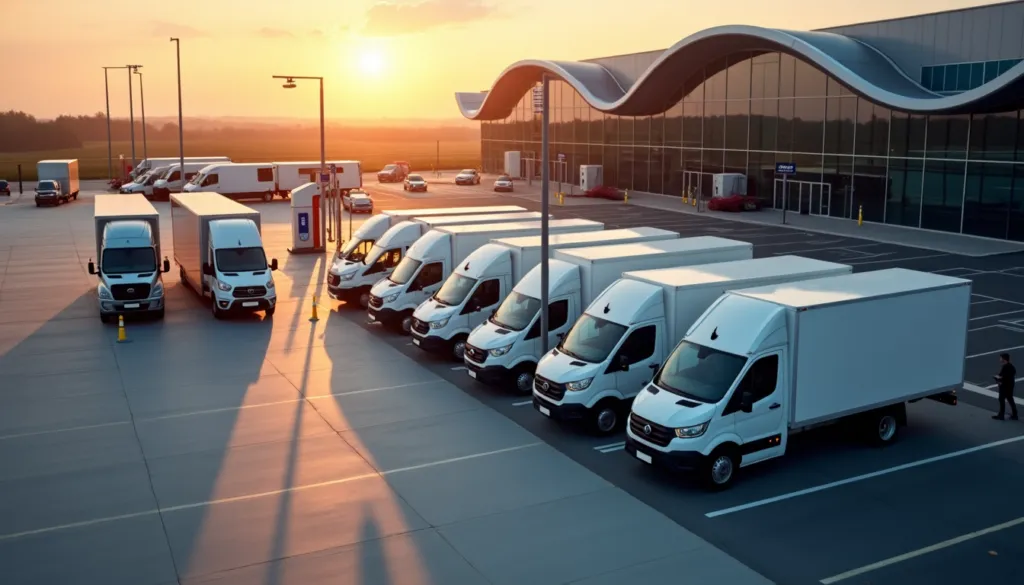
Get home early with RoadWarrior.
Enter your stops, optimize your routes, manage your team – quickly and efficiently.
Try RoadWarrior free for 7 days
Try free for 7 daysAre you considering starting your own tow truck business? With the automobile towing industry in the United States worth $11.3 billion and expected to grow by 2.9% by 2022, there are ample opportunities for success in this field. In this comprehensive guide, we will walk you through the necessary steps to establish a profitable and thriving tow trucking business. From obtaining the required permits and licenses to providing exceptional service, we will cover everything you need to know to get started.
Why Start a Towing Business?
Starting a towing business offers numerous benefits and opportunities for profitability. Here are some compelling reasons to consider venturing into the tow trucking industry:
- High-profit margins: Tow truck businesses typically see net profit margins ranging from 10% to 15%. Astute business owners have achieved remarkable profit margins as high as 70%.
- Independence: As the owner of a tow truck business, you are your own boss. You have the freedom to make decisions and shape the direction of your company.
- Mechanical knowledge: Having a good eye for mechanics can be advantageous in the towing industry. Understanding vehicle mechanics allows you to identify automotive issues and provide valuable advice to customers.
- Ability to handle high-stress scenarios: Towing professionals often encounter uncooperative vehicle owners who may become aggressive. If you thrive in high-stress situations and can handle difficult interactions with professionalism, the towing industry may be a good fit for you.
- Scalability: The tow trucking business is highly scalable. With the constant need for towing services, you can expand your business to offer additional services, features, and products, catering to a wide range of customers.
Now that we’ve explored the reasons why starting a towing business is an attractive venture, let’s dive into the steps you need to take to establish a successful tow truck company.
Step 1: Choose the Towing Services You Want to Provide
Before starting your tow truck business, it’s essential to determine the type of towing services you want to offer. There are two primary categories: retail towing (consensual towing) and non-consensual towing.
- Retail Towing: This involves providing roadside assistance to customers whose vehicles have broken down or been involved in accidents.
- Non-consensual Towing: Non-consensual towing companies work with private property owners and law enforcement to tow illegally parked vehicles or those in violation of the law. However, non-consensual towing companies face challenges such as dealing with uncooperative vehicle owners and strict local regulations.
Consider the dynamics of each type of towing and evaluate the market demand in your area to determine which services align with your business goals and location.
Step 2: Create a Comprehensive Business Plan
A well-crafted business plan is crucial for the success of any tow trucking company. It provides a roadmap for your business and helps you make informed decisions. Consider the following elements when developing your business plan:
- Services: Clearly outline the towing services your company will provide, including roadside assistance, vehicle recovery, and any specialized services.
- Target Market: Identify your target audience, whether it’s individuals in need of roadside assistance or businesses requiring towing services for their fleet.
- Competitive Analysis: Research and analyze your competition to identify their strengths, weaknesses, and gaps in the market that you can capitalize on.
- Marketing Strategy: Develop a marketing plan to promote your tow trucking business, including online and offline marketing channels, such as a website, social media presence, and advertising campaigns.
- Financial Projections: Estimate the startup costs, ongoing expenses, and projected revenue to create a financial forecast for your business. This will help you determine pricing strategies and profitability.
- Operations: Define the operational logistics, such as the number of tow trucks, drivers, and equipment you will need, as well as the processes for dispatching, customer service, and vehicle maintenance.
Remember to regularly review and update your business plan as your company evolves.
Step 3: Register Your Business and Obtain Licenses and Permits
To operate legally, you need to register your tow trucking business and obtain the necessary licenses and permits. Here are some essential steps to follow:
- Choose a Legal Entity: Decide on the legal structure of your business, such as a limited liability company (LLC) or a corporation. Consult with a lawyer or an accountant to determine the best option for your specific circumstances.
- Register with State and Local Agencies: Register your business with the appropriate state and local agencies. This includes obtaining a business license and any permits required for towing and vehicle transportation.
- Get Insurance Coverage: Acquire proper insurance coverage to protect your business and clients. This includes liability insurance, commercial auto insurance, and workers’ compensation insurance if you have employees.
- Obtain a Tow Driver ID: If you plan to drive a tow truck yourself, you will need a Tow Driver ID. Requirements vary by location, but generally, you must be 18 years or older, hold a commercial driver’s license, have a clean driving record, and meet any additional criteria set by your state or region.
Ensure that you comply with all legal requirements and maintain the necessary documentation to operate your tow trucking business smoothly.
Step 4: Purchase Reliable Tow Trucks and Equipment
Investing in dependable tow vehicles and specialized equipment is crucial for the efficiency and quality of your towing services. Consider the following factors when purchasing tow trucks:
- Type of Tow Trucks: Choose the appropriate type of tow trucks based on the services you offer. Options include flatbed trucks, tow trucks with wheel lifts, and heavy-duty tow trucks for commercial vehicles.
- Condition and Maintenance: Buy well-maintained tow vehicles to minimize downtime and ensure reliable operation. Regularly service and maintain your tow trucks to prolong their lifespan and avoid costly repairs.
- Additional Equipment: Depending on your services, you may need additional equipment such as winches, dollies, jumpstart kits, and tire replacement tools. Invest in high-quality equipment to provide efficient and reliable towing services.
Remember to budget for the purchase of tow trucks and equipment, considering the cost, financing options, and ongoing maintenance expenses.
Step 5: Develop Efficient Routes with RoadWarrior
Efficient route planning is essential for a successful tow trucking business. Prompt response times are crucial in this industry, as customers often require immediate assistance. Manual route planning can be time-consuming and inefficient.
To optimize your routes and reduce unnecessary overhead costs, consider using route planning software like RoadWarrior. This intelligent software helps you plan and optimize routes, ensuring faster response times, reduced fuel costs, and improved fleet management.
RoadWarrior provides real-time data and customer details, streamlining your operations and enhancing customer satisfaction. Sign up for a free trial to experience the benefits of efficient route planning for your tow trucking business.
Step 6: Provide Exceptional Customer Service
Delivering exceptional customer service is crucial for the success of your tow trucking business. Here are some tips to ensure customer satisfaction:
- Prompt Response: Aim to respond to customer requests quickly and efficiently. Strive for fast arrival times, especially in emergency situations.
- Professionalism and Courtesy: Train your team to interact with customers professionally and courteously. Provide clear communication and empathetic support throughout the towing process.
- Additional Services: Consider offering additional services like tire replacements, jump starts, and roadside assistance to enhance customer satisfaction and generate additional revenue streams.
- Transparent Pricing: Clearly communicate your pricing structure to customers, whether it’s based on a flat rate, hourly rate, or distance traveled. Avoid hidden fees and provide accurate estimates.
By prioritizing exceptional customer service, you’ll establish a positive reputation and gain loyal customers who will recommend your services to others.
Step 7: Market and Promote Your Tow Trucking Business
Effectively marketing your tow trucking business is essential for attracting customers and increasing brand visibility. Here are some strategies to consider:
- Create a Professional Website: Develop a user-friendly website that highlights your services, contact information, and customer testimonials. Optimize your website for search engines to improve its visibility.
- Utilize Online Platforms: Create business profiles on popular online platforms such as Google My Business, Yelp, and social media platforms. Encourage satisfied customers to leave reviews and ratings.
- Local Advertising: Advertise your tow trucking business in local newspapers, radio stations, and online directories. Distribute flyers and business cards to local businesses and auto repair shops.
- Networking and Partnerships: Build relationships with roadside assistance companies, auto repair shops, and insurance agencies to secure referrals and partnerships.
- Vehicle Branding: Brand your tow trucks with your company logo, contact information, and a professional design. This serves as a mobile advertisement for your business and increases brand visibility.
Implement a well-rounded marketing strategy to reach your target audience and establish your tow trucking business as a trusted and reliable service provider.
Step 8: Focus on Business Operations and Efficiency
Efficient business operations are essential for the success of your tow trucking company. Consider the following factors to enhance operational efficiency:
- Dispatch and Communication: Implement a streamlined dispatch system to efficiently allocate jobs to your tow truck drivers. Utilize effective communication channels to ensure real-time updates and coordination.
- Vehicle Maintenance and Inspections: Regularly inspect and maintain your tow trucks to prevent breakdowns and ensure optimal performance. Create a maintenance schedule and keep detailed records of repairs and inspections.
- Record-Keeping and Invoicing: Maintain accurate records of towing operations, including tow logs, invoices, and customer information. Utilize software or systems to automate record-keeping and simplify tax reporting.
- Employee Training and Development: Invest in training programs to enhance the skills of your tow truck drivers and other employees. Provide ongoing professional development opportunities to stay updated with industry trends and regulations.
By focusing on operational efficiency, you can minimize downtime, reduce costs, and provide a seamless experience for both your team and customers.
Step 9: Adapt and Evolve Your Business
The tow trucking industry is constantly evolving, and it’s essential to adapt to changes and stay ahead of the competition. Consider the following strategies to ensure the long-term success of your business:
- Stay Informed: Stay updated with industry trends, technological advancements, and changes in regulations. Attend industry conferences, join professional networks, and engage with industry publications.
- Diversify Services: Continuously assess the market and identify opportunities to expand your services. Consider offering specialized towing services, such as heavy-duty towing or equipment transportation, to cater to specific customer needs.
- Invest in Technology: Embrace technology to enhance your operations. Explore software solutions for dispatch management, customer relationship management, and accounting to streamline your business processes.
- Customer Feedback: Regularly solicit feedback from your customers to identify areas for improvement and address any concerns. Use customer feedback to enhance your services and maintain high customer satisfaction levels.
By adapting to changing market dynamics and embracing innovation, you can ensure the long-term success and growth of your tow trucking business.
Step 10: Maintain Safety and Compliance
Safety should be a top priority in the tow trucking industry. Ensure compliance with safety regulations and maintain a safe working environment for your team and customers. Consider the following measures:
- Driver Training: Provide comprehensive training to your tow truck drivers, emphasizing safe driving practices, vehicle handling, and customer interactions.
- Safety Equipment: Equip your tow trucks with essential safety equipment, including reflective vests, warning lights, and proper securing devices for towing operations.
- Insurance Coverage: Maintain adequate insurance coverage to protect your business and clients in the event of accidents or damages.
- Regular Inspections: Regularly inspect your tow trucks and equipment to identify potential safety issues. Address any maintenance or repair needs promptly.
By prioritizing safety and compliance, you demonstrate professionalism, enhance customer trust, and mitigate potential risks.
Conclusion
Starting a successful tow trucking business requires careful planning, attention to detail, and a commitment to providing exceptional service. By following the steps outlined in this comprehensive guide, you can establish a profitable and reputable tow trucking company. Remember to prioritize customer satisfaction, invest in reliable vehicles and equipment, and continuously adapt to industry changes. With the right strategies and a passion for serving your customers, your tow trucking business can thrive in this ever-growing industry.
Don’t let inefficient route planning hinder your tow trucking operations. Try RoadWarrior for efficient route optimization and streamline your business. Sign up for a free trial today and experience the benefits of smarter route planning.


